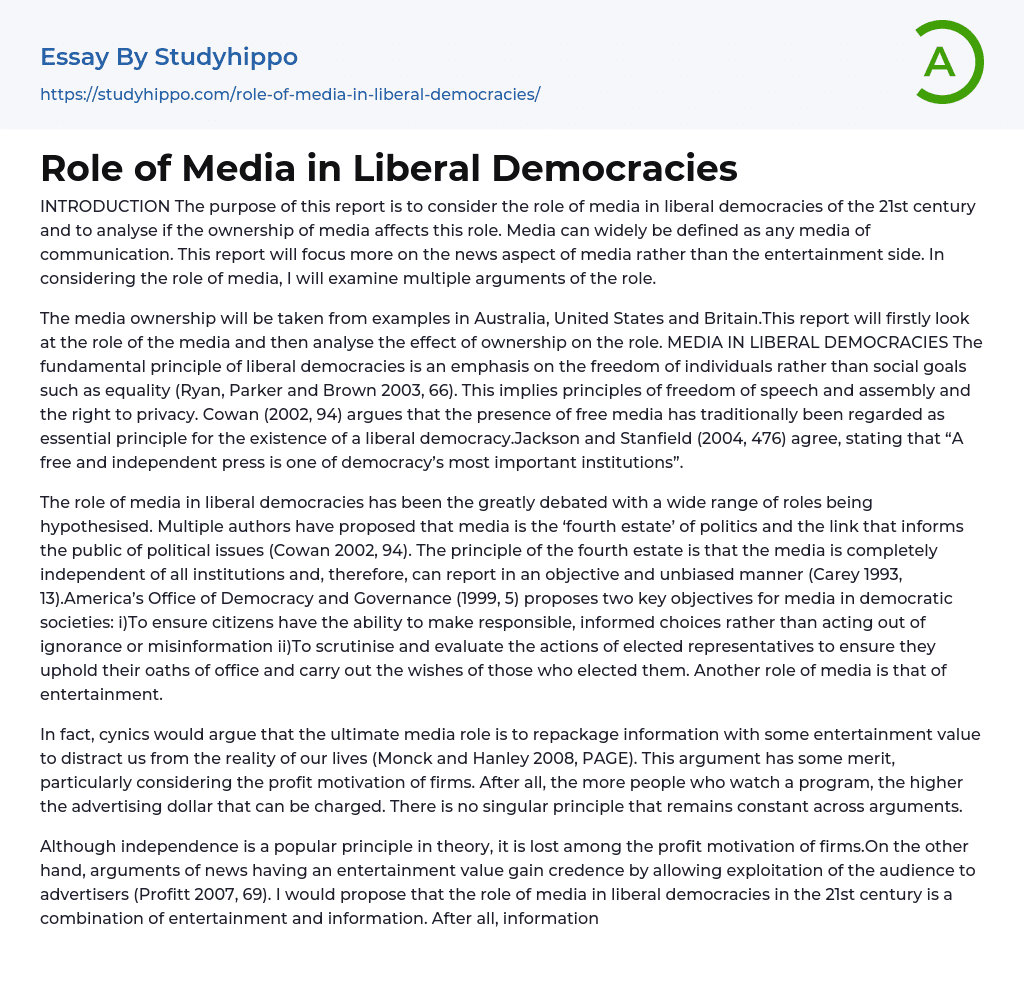INTRODUCTION The purpose of this report is to consider the role of media in liberal democracies of the 21st century and to analyse if the ownership of media affects this role. Media can widely be defined as any media of communication. This report will focus more on the news aspect of media rather than the entertainment side. In considering the role of media, I will examine multiple arguments of the role.
The media ownership will be taken from examples in Australia, United States and Britain.This report will firstly look at the role of the media and then analyse the effect of ownership on the role. MEDIA IN LIBERAL DEMOCRACIES The fundamental principle of liberal democracies is an emphasis on the freedom of individuals rather than social goals such as equality (Ryan, Parker and Brown 2003, 66). This implies principles of freedom of speec
...h and assembly and the right to privacy. Cowan (2002, 94) argues that the presence of free media has traditionally been regarded as essential principle for the existence of a liberal democracy.Jackson and Stanfield (2004, 476) agree, stating that “A free and independent press is one of democracy’s most important institutions”.
The role of media in liberal democracies has been the greatly debated with a wide range of roles being hypothesised. Multiple authors have proposed that media is the ‘fourth estate’ of politics and the link that informs the public of political issues (Cowan 2002, 94). The principle of the fourth estate is that the media is completely independent of all institutions and, therefore, can report in an objective and unbiased manner (Carey 1993, 13).America’s Office of Democracy and Governance (1999, 5) propose
two key objectives for media in democratic societies: i)To ensure citizens have the ability to make responsible, informed choices rather than acting out of ignorance or misinformation ii)To scrutinise and evaluate the actions of elected representatives to ensure they uphold their oaths of office and carry out the wishes of those who elected them. Another role of media is that of entertainment.
In fact, cynics would argue that the ultimate media role is to repackage information with some entertainment value to distract us from the reality of our lives (Monck and Hanley 2008, PAGE). This argument has some merit, particularly considering the profit motivation of firms. After all, the more people who watch a program, the higher the advertising dollar that can be charged. There is no singular principle that remains constant across arguments.
Although independence is a popular principle in theory, it is lost among the profit motivation of firms.On the other hand, arguments of news having an entertainment value gain credence by allowing exploitation of the audience to advertisers (Profitt 2007, 69). I would propose that the role of media in liberal democracies in the 21st century is a combination of entertainment and information. After all, information itself doesn’t sell and entertainment with no substance (when applying to news programs) also does not sell. While independence from governments in power and corporations would be ideal, the reality is that it will never be achieved even in supposed liberal democracy societies.ARE MEDIA FULFILLING THEIR ROLE? “Lines blur in the new media world.
The only line that doesn’t is the bottom one: profit” – Michael Bugeja Unquestionably, the main objective of the majority of firms worldwide
is one of maximisation of profit. The same is true for media corporations. This raises the question of whether media corporations can truly be independent and objective in their reporting if they are receiving money for advertising from the politicians and business they supposed to scrutinise and evaluate.Sally McFall (2002, 126) argues that journalists very aware of the value of advertising to their firms and will self-censor stories or risk losing their careers. Advertisers that can exert pressure by threatening to withdraw advertising campaigns or even legal action against media firms. In fact, it has been argued that news will be turned into entertainment to sell audiences to advertisers (Profitt 2007, 69).
This argument means that not only will advertisers hold the power in the business relationship but also that media corporations will present their news as entertainment rather than objective reports. CONCLUSION The role of media in liberal democracies is one of entertainment and reporting of important information. However, as media firms seek to maximise their profits, this role may be biased towards their advertisers or their own political beliefs. Therefore, the role may be tainted by ownership. However, the alternative of government ownership flies in the face of all modern liberal beliefs.
- Sales Promotion essays
- Advertising campaign essays
- National News essays
- The view essays
- Advertisement essays
- Advertising essays
- Anheuser-busch essays
- Audience Theory essays
- Brand essays
- Brands essays
- Competitor Analysis essays
- Consumer essays
- Detergent essays
- Marketing Management essays
- Marketing Mix essays
- Marketing Plan essays
- Marketing Research essays
- Marketing Strategy essays
- New Product Development essays
- Point Of Sale essays
- Price essays
- Procurement essays
- Product essays
- Product Differentiation essays
- Product Placement essays
- Promotion essays
- Promotion And Marketing Communications essays
- Research Design essays
- Retailing essays
- Trademark essays
- Absolutism essays
- Appeal essays
- Bourgeoisie essays
- Contras essays
- Corporate Governance essays
- Corruption essays
- Democracy essays
- Democratic Party essays
- Developed Country essays
- Dictatorship essays
- Elections essays
- European Union essays
- Federalism essays
- Foreign essays
- Foreign policy essays
- Gentrification essays
- Hillary Clinton essays
- Income Tax essays
- International Relations essays
- John Marshall essays




